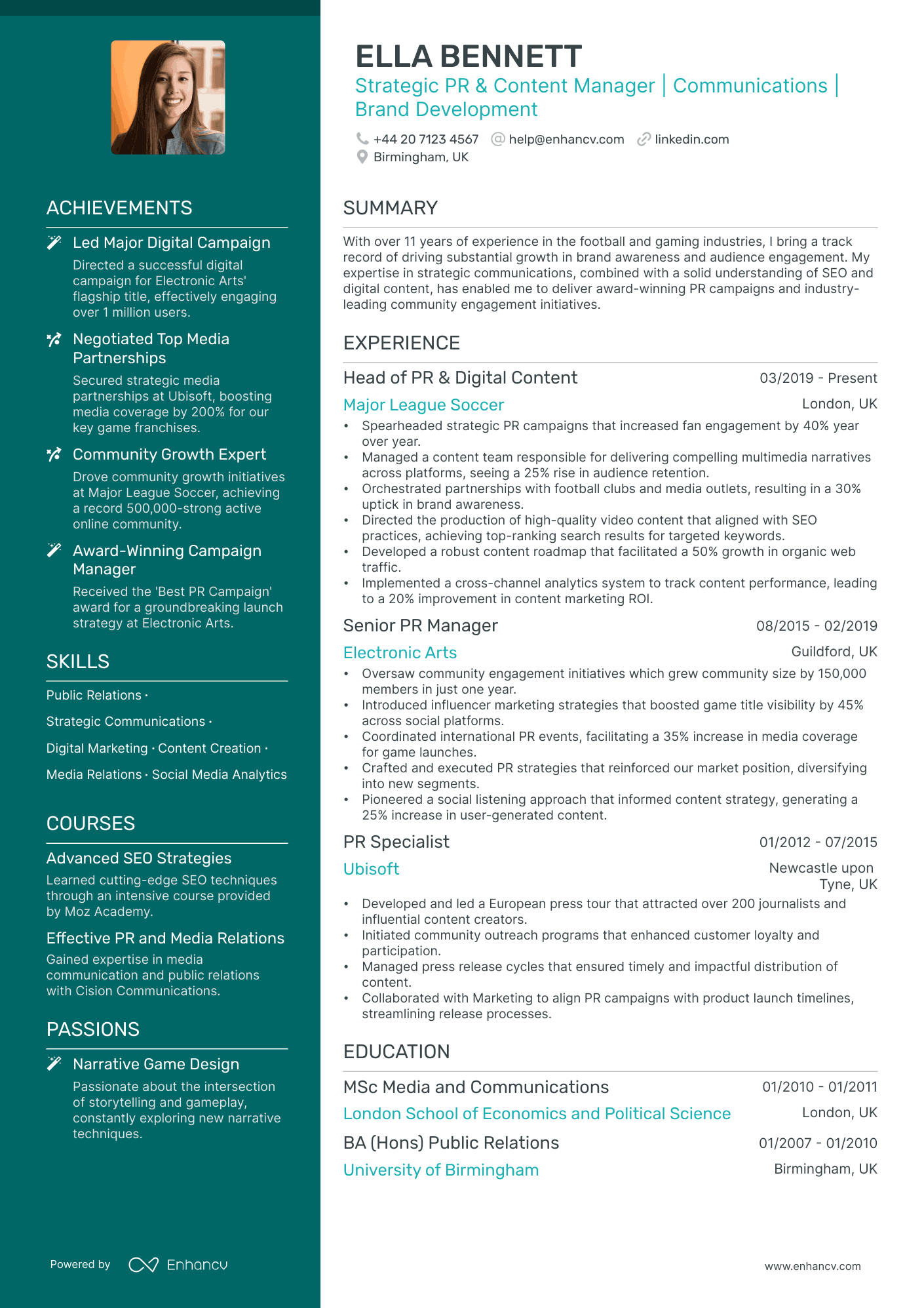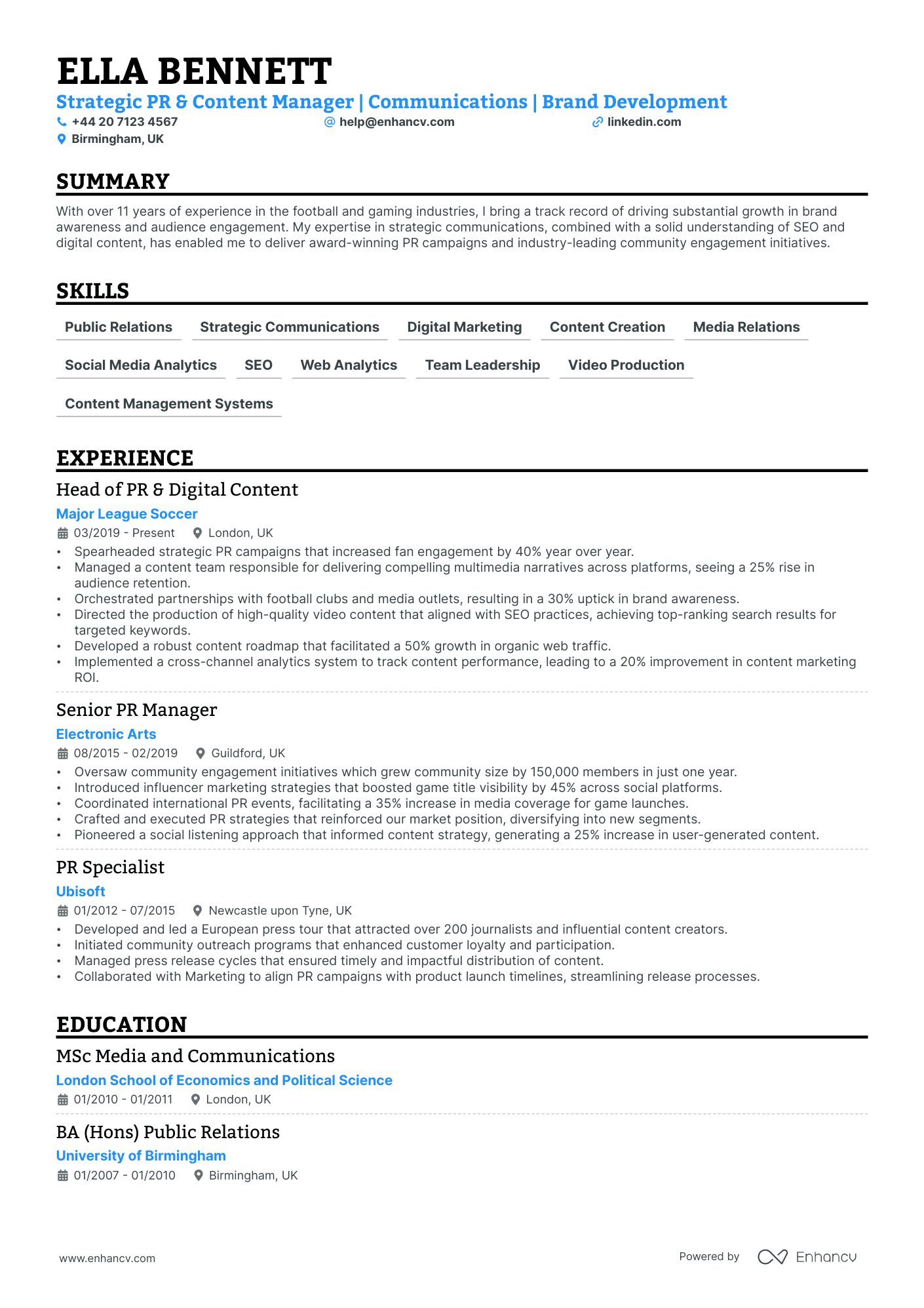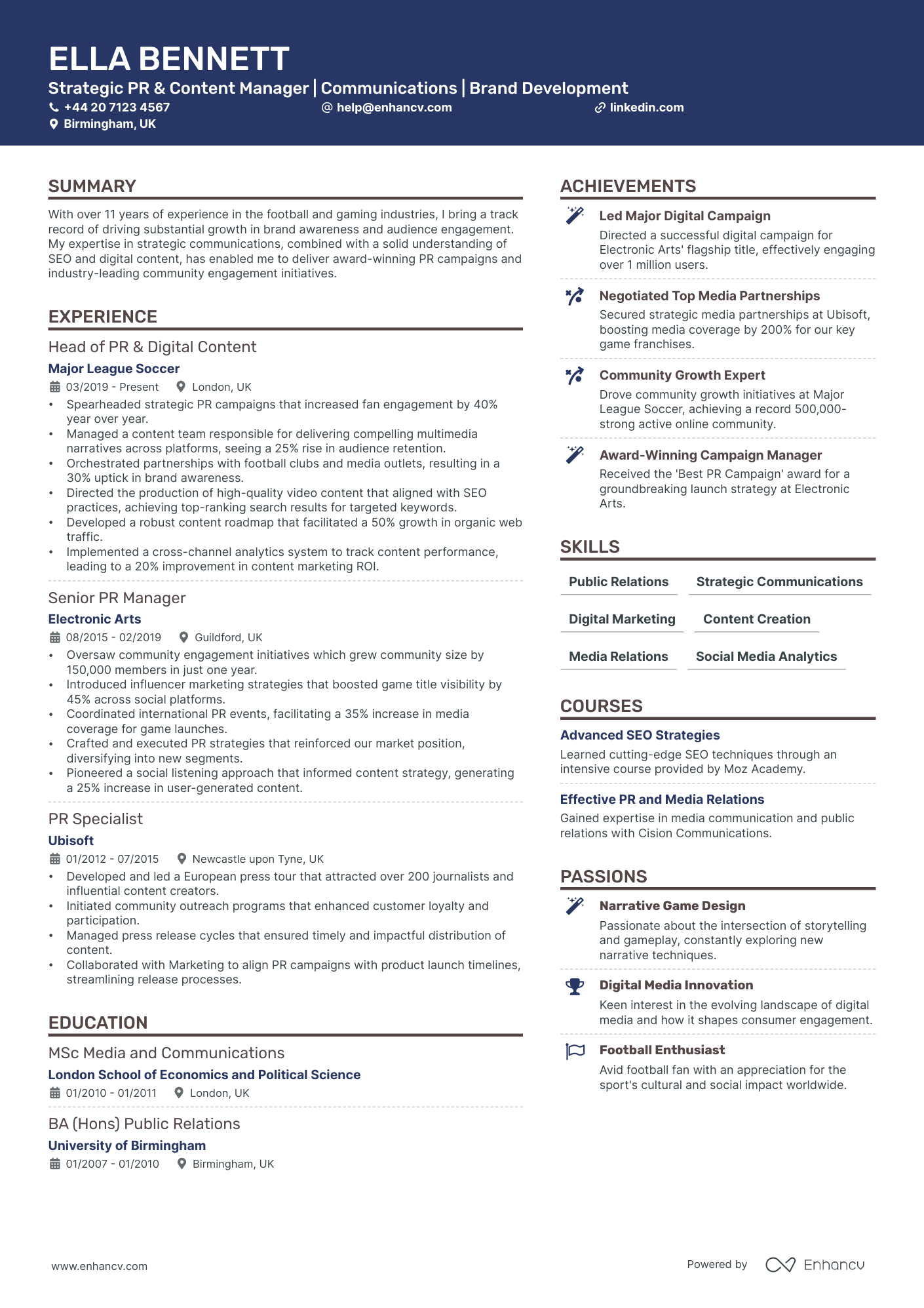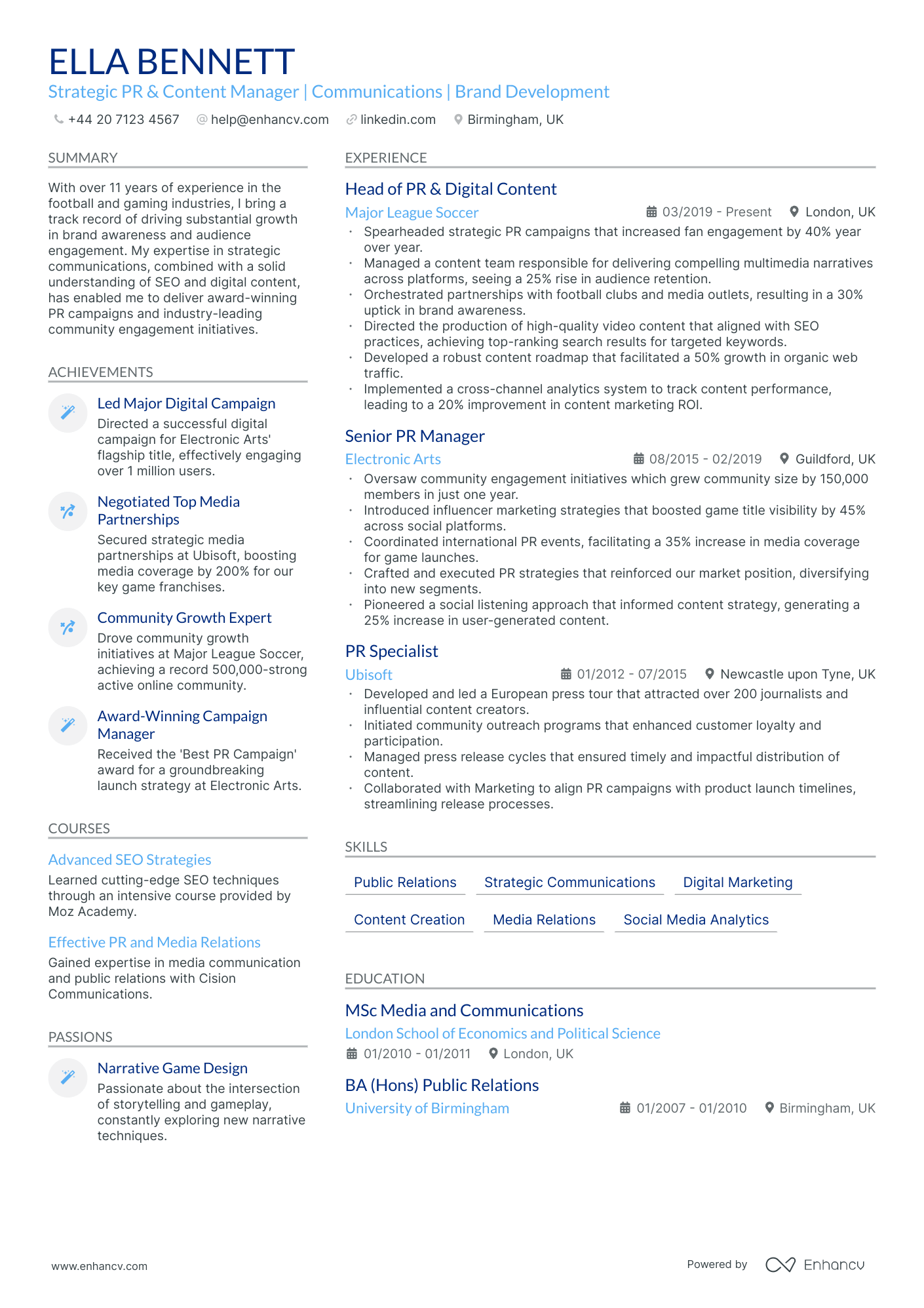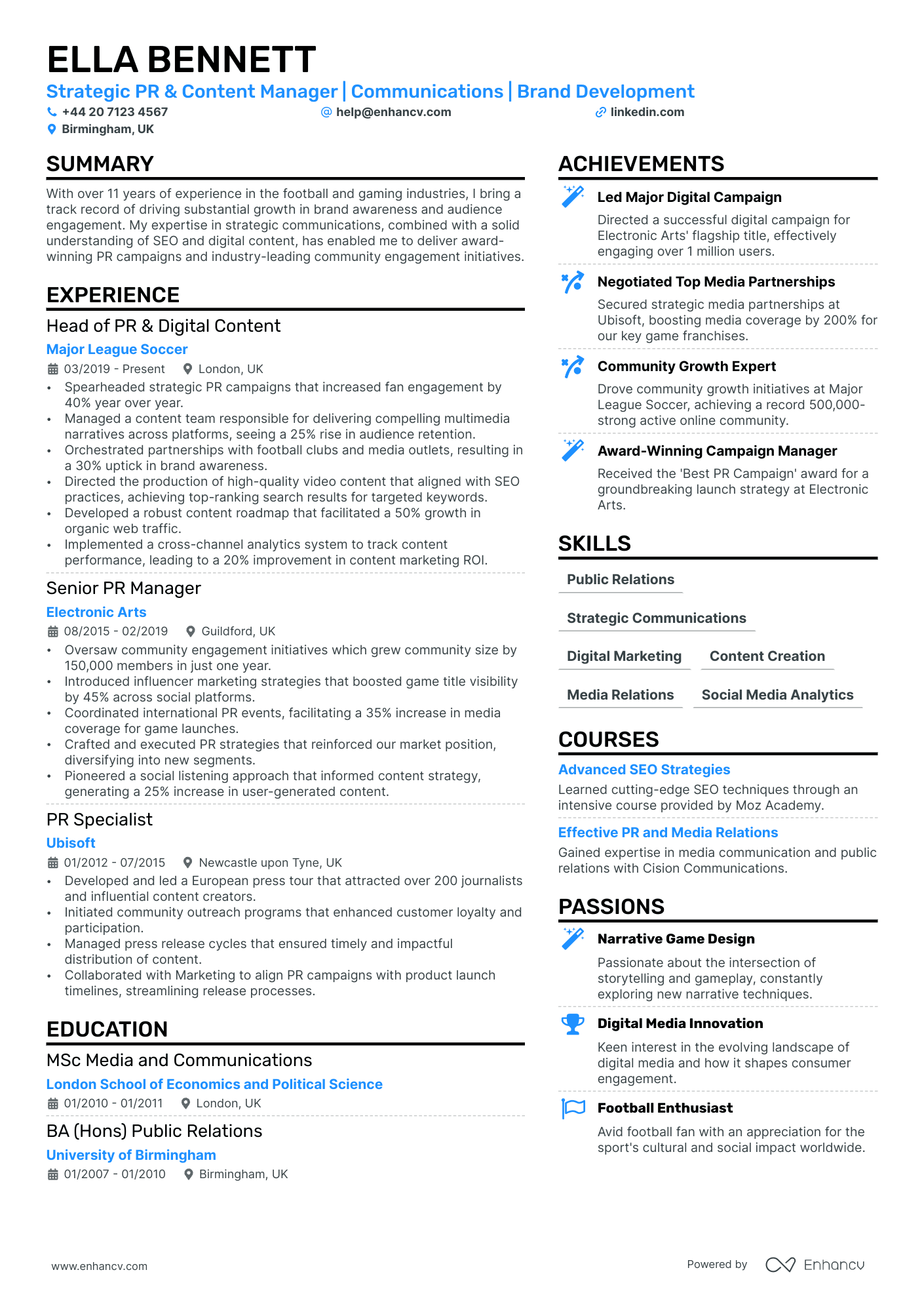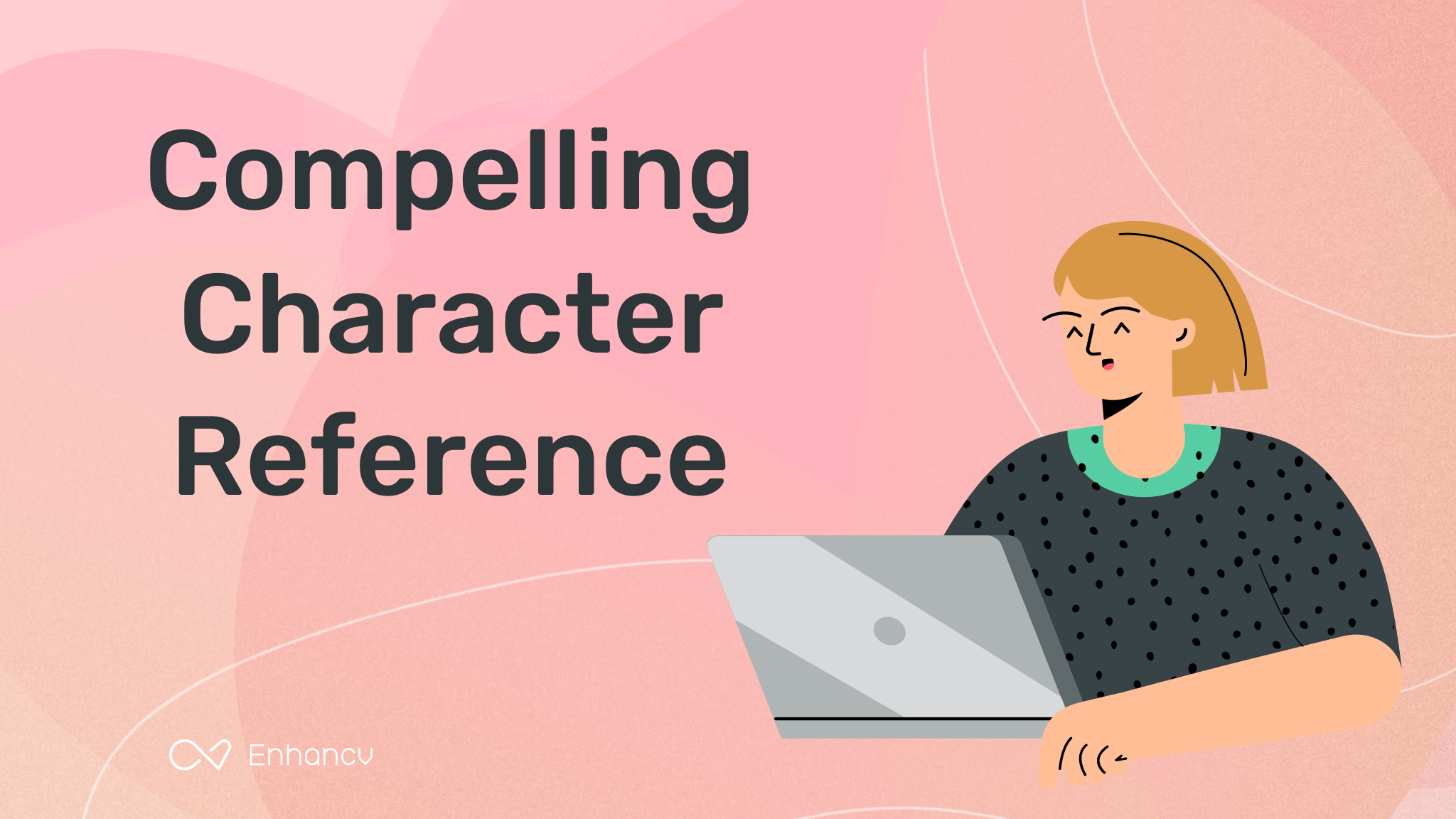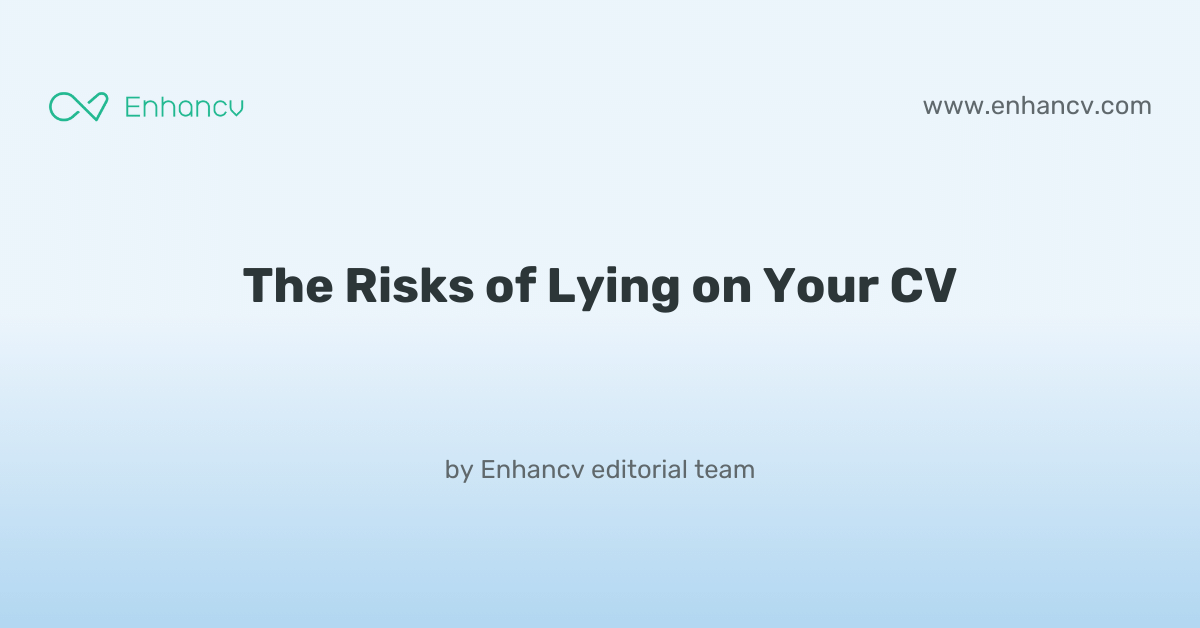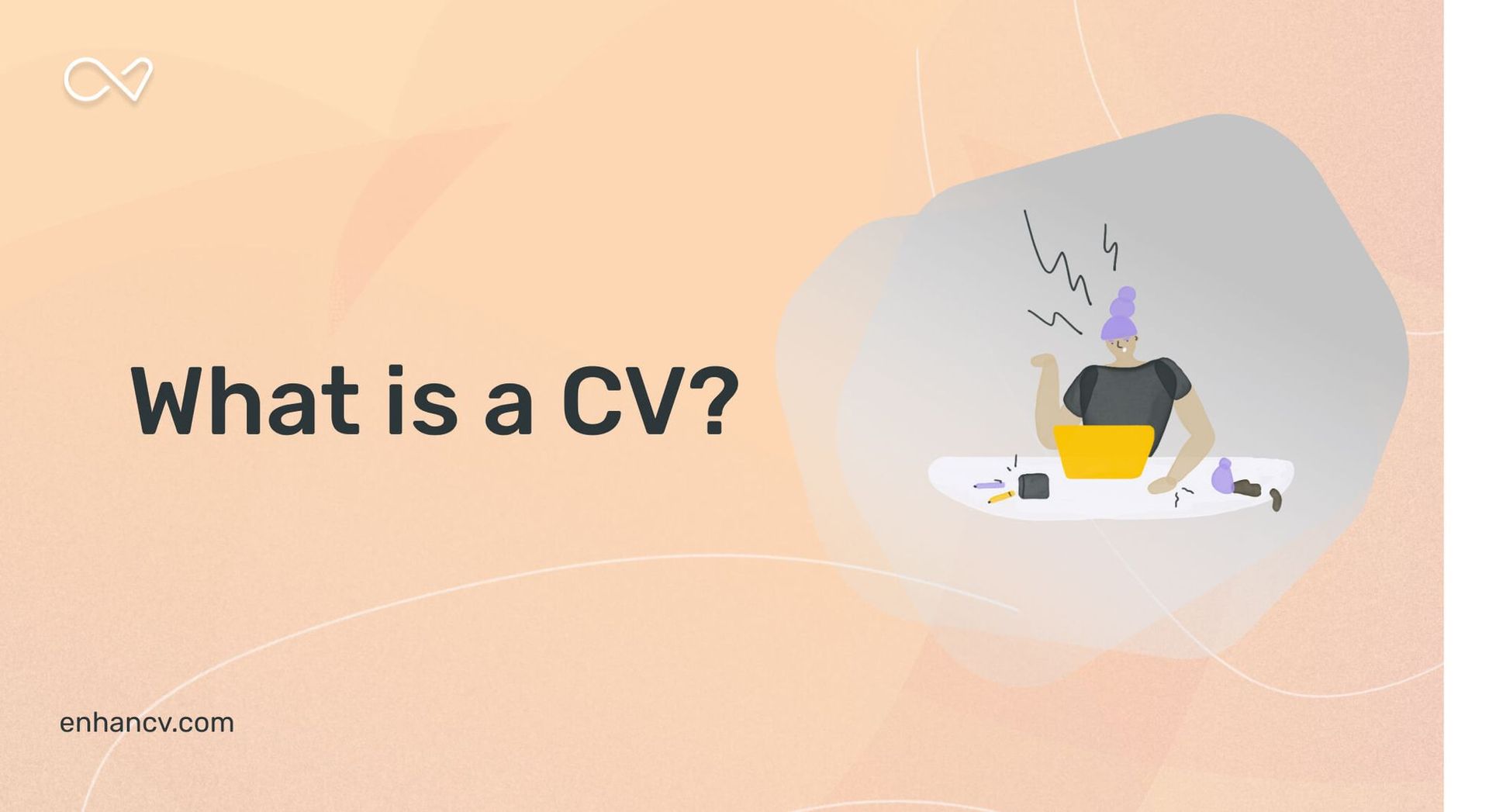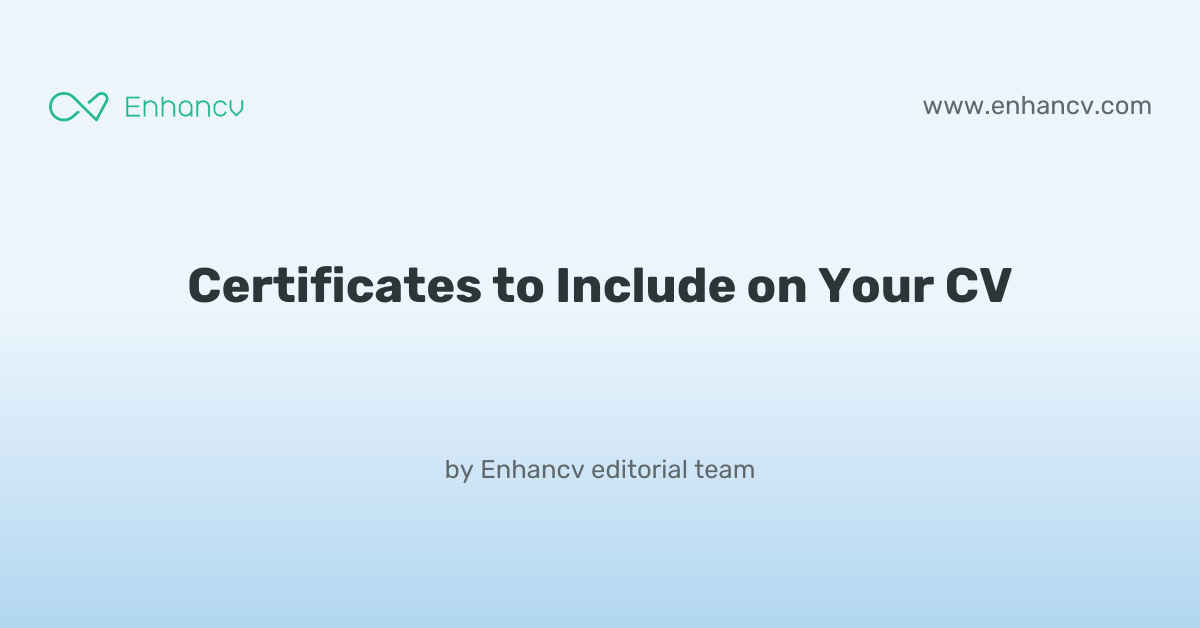Crafting a CV in the public relations sector can prove challenging due to the need to encapsulate a blend of creative, strategic, and communication skills concisely. Our guide offers tailored advice to ensure your talents are showcased effectively, making your application stand out in a competitive field.
- Design and format your professional public relations CV;
- Curate your key contact information, skills, and achievements throughout your CV sections;
- Ensure your profile stays competitive by studying other industry-leading public relations CVs;
- Create a great CV even if you happen to have less professional experience, or switching fields.
When writing your public relations CV, you may need plenty of insights from hiring managers. We have prepared industry-leading advice in the form of our relevant CV guides.
Formatting your public relations CV to meet the role expectations
Staring at the blank page for hours on end, you still have no idea how you should start your professional public relations CV. Should you include more colours, two columns, and which sections? What you should remember about your CV format is this - ensure it's minimalistic and doesn't go over the top with fancy fonts and many colours. Instead, focus on writing consistent content that actually answers the job requirements. But, how about the design itself :- Use the reverse chronological order to showcase your experience, starting with your most recent role;
- Include your contact details (email address, phone number, and location) - and potentially your professional photo - in the header;
- Must-have CV sections include summary or objective, experience, education, and skills: curate the ones that fit your profile;
- Your professional public relations CV should be between one-to-two pages long: select the longer format if you have more experience.
A little bit more about your actual CV design, ensure you're using:
- plenty of serif or sans serif font (e.g. Montserrat, Exo 2, Volkhov) as they are Applicant Tracker System (ATS) compliant. Avoid the likes of Arial and Times New Roman because most candidates' CVs are in this typography.
When submitting your CV, are you still not sure what format it should be? Despite the myth that has been circling around, most modern ATS systems are perfectly capable of reading PDFs. This format is an excellent choice as it keeps all of your information intact.
PRO TIP
For certain fields, consider including infographics or visual elements to represent skills or achievements, but ensure they are simple, professional, and enhance rather than clutter the information.
The top sections on a public relations CV
- Professional Summary reflects your PR expertise, essential to grab attention.
- Key PR Skills showcase your relevant competencies for the role.
- Public Relations Experience lists your past roles and their impact.
- Education and Qualifications demonstrate your foundational knowledge.
- Portfolio of Campaigns highlights successful projects you've managed.
What recruiters value on your CV:
- Highlight your communication skills by outlining specific PR campaigns where your strategies significantly enhanced brand visibility and reputation.
- Feature any media relationships you've cultivated, showcasing your ability to secure coverage and manage interactions with journalists and influencers.
- Emphasise your writing prowess, including examples of press releases, pitches, and content you've crafted that led to successful public relations outcomes.
- Demonstrate your crisis management experience, providing details of situations where you successfully navigated and mitigated potential negative publicity for a company or client.
- Showcase your social media expertise by describing successful campaigns you've managed across various platforms, noting increases in engagement, followers, or conversion rates.
Recommended reads:
What information should you include in your public relations CV header?
The CV header is potentially the section that recruiters would refer to the most, as it should include your:
- Contact details - your professional (non-work) email address and phone number;
- Professional photograph - if you're applying hinting at the value you bring as a professional.
Many professionals often struggle with writing their public relations CV headline. That's why in the next section of this guide, we've curated examples of how you can optimise this space to pass any form of assessment.
Examples of good CV headlines for public relations:
- Head of Corporate Communications | Strategic Brand Management | MSc Public Relations | 12+ Years' Experience
- PR Specialist | Media Relations | Event Coordination | CIPR Accredited | 5 Years' Industry Insight
- Senior PR Consultant | Crisis Communication Expert | Integrated Campaigns | 10 Years' Hands-On Practice
- Junior PR Coordinator | Content Creation | Social Media Savvy | BA Hons Communications | Eager Innovator
- PR Manager | Government Relations | Stakeholder Engagement | Certified PR Professional | 8+ Years' Expertise
- Director of Public Affairs | Issue Advocacy | Corporate Social Responsibility | BSc, 15 Years' Leadership
Opting between a public relations CV summary or objective
Within the top one third of your public relations CV, you have the opportunity to briefly summarise your best achievements or present your professional goals and dreams. Those two functions are met by either the CV summary or the objective.
- The summary is three-to-five sentences long and should narrate your best successes, while answering key requirements for the role. Select up to three skills which you can feature in your summary. Always aim to present what the actual outcomes were of using your particular skill set. The summary is an excellent choice for more experienced professionals.
- The objective is more focused on showcasing your unique value as a candidate and defining your dreams and ambitions. Think about highlighting how this current opportunity would answer your career vision. Also, about how you could help your potential employers grow. The objective matches the needs of less experienced candidates, who need to prove their skill set and, in particular, their soft skills.
Still not sure about how to write your CV opening statement? Use some best industry examples as inspiration:
CV summaries for a public relations job:
- Accomplished Public Relations Manager with over 10 years of experience in the tech industry, expert in strategic communication planning and brand management. Boasting a proven track record of facilitating 20% year-on-year brand growth through innovative campaign strategies and media relations.
- Seasoned PR Specialist with a dynamic 8-year career at a leading New York fashion firm, adept at leveraging social media to double online engagement and execute successful product launches with high-profile influencers.
- Dedicated marketing professional transitioning to Public Relations, bringing 5 years of experience in social media management and content creation. Acknowledged for increasing online community engagement by 30% within the first year at a prominent e-commerce company.
- Experienced journalist with a 6-year career at a major London newspaper desiring to pivot to Public Relations, offering strong storytelling abilities, excellent writing skills, and a deep understanding of media landscape and press communications.
- Eager to embark on a Public Relations career path, utilizing strong interpersonal skills, a Bachelor's degree in Mass Communications, and a genuine passion for establishing positive media relationships and crafting compelling stories.
- Aspiring to begin a career in Public Relations, offering a fresh perspective, enthusiasm for developing robust corporate communication strategies, and a commitment to mastering the craft of public engagement and reputation management.
The best formula for your public relations CV experience section
The CV experience section is the space where many candidates go wrong by merely listing their work history and duties. Don't do that. Instead, use the job description to better understand what matters most for the role and integrate these keywords across your CV. Thus, you should focus on:
- showcasing your accomplishments to hint that you're results-oriented;
- highlighting your skill set by integrating job keywords, technologies, and transferrable skills in your experience bullets;
- listing your roles in reverse chronological order, starting with the latest and most senior, to hint at how you have grown your career;
- featuring metrics, in the form of percentage, numbers, etc. to make your success more tangible.
When writing each experience bullet, start with a strong, actionable verb, then follow it up with a skill, accomplishment, or metric. Use these professional examples to perfect your CV experience section:
Best practices for your CV's work experience section
- Demonstrate a track record of successful PR campaigns: Mention specific examples where you created or managed PR campaigns that significantly increased brand visibility or improved public perception.
- Highlight media relations skills: Explain how you've effectively built and maintained relationships with journalists, bloggers, and influencers to secure media coverage for your clients or company.
- Showcase your writing prowess: Detail your experience in crafting press releases, bylines, speeches, or other PR materials that have delivered results and garnered positive media attention.
- Quantify your results: Use statistics to illustrate the impact of your PR efforts, such as the percentage increase in media mentions, social media engagement, or the reach of a particular campaign.
- Exhibit crisis management expertise: Share examples of how you've successfully navigated challenging situations, mitigated negative publicity, and protected the reputation of your organisation.
- Mention your digital savvy: Elaborate on your experience with digital PR strategies, including social media campaigns and content marketing, and how you've used analytics to measure and refine your approach.
- Detail your strategic thinking: Describe how you've developed long-term PR strategies that align with business objectives, target the right audiences, and leverage the appropriate channels for maximum effect.
- Emphasise communication skills: Provide instances where your ability to communicate effectively, both verbally and in writing, has led to better team collaborations and successful project outcomes.
- Illustrate your adaptability: Point out instances where you've quickly adapted to changes in the media landscape or within your organisation, ensuring that your PR efforts remain effective and relevant.
- Spearheaded comprehensive media campaigns that yielded a 40% increase in brand awareness for top-tier clients in the tech industry.
- Coordinated with international influencers to create targeted content, boosting customer engagement rates by over 30% within six months.
- Managed crisis communication for a high-profile data breach, effectively minimising negative press and regaining public trust within the fiscal quarter.
- Devised and implemented a strategic PR roadmap for a new product launch, which contributed to a 25% sales uplift in the first quarter post-launch.
- Facilitated media training sessions for C-suite executives, enhancing company representation and messaging across various media channels.
- Orchestrated a charity event that attracted high-profile participation and covered by major publications, raising over £50,000 for environmental initiatives.
- Crafted bespoke PR pitches that led to features in Forbes, The Guardian, and BBC, enhancing the company's industry thought leadership position.
- Cultivated lasting relationships with journalists, resulting in a 50% reduction in time-to-publish for press releases.
- Led a multidisciplinary team to support a rebranding initiative, ensuring seamless communication across all platforms and stakeholder groups.
- Implemented an innovative social media strategy increasing brand visibility by 200% within the targeted demographic.
- Developed engaging corporate social responsibility reports resulting in positive coverage from sustainability-focused publications.
- Negotiated with event organisers to secure keynote speaking slots for the CEO, positioning the company as a leader in industry innovation.
- Co-led a digital transformation of the PR department, incorporating analytics tools that increased campaign measurement efficiency by 35%.
- Strategically managed product recalls, mitigating potential negative press and preserving customer loyalty.
- Initiated a partner outreach programme that expanded the media network by 100+ online and print outlets within the year.
- Designed a viral marketing campaign that garnered 5 million views in two weeks, dramatically increasing online engagement metrics.
- Directed a cross-functional team to develop an award-winning corporate brand strategy, achieving accolades at the PR Week Awards.
- Oversaw the successful PR launch of three major product lines, each exceeding initial sales forecasts by at least 20%.
- Championed a B2B communication strategy that supported a market penetration increase from 15% to 35% within the energy sector.
- Authored insightful whitepapers and opinion pieces that strengthened the company's profile among industry peers.
- Leveraged data-driven insights to refine PR tactics, resulting in a cost savings of 10% on overall campaign budgets.
- Implemented an employee advocacy program which improved the company's eNPS score by 15 points, fostering a stronger internal brand culture.
- Conducted comprehensive reputation management and monitoring, decreasing the impact of negative sentiment by 40% year-over-year.
- Collaborated with marketing to align PR strategies with promotional campaigns, resulting in consistent messaging and amplified campaign reach.
Lacking professional expertise: how to write your CV to highlight your best talents
Don't count on your lucky stars when you're applying for a role, where you happen to have less (or almost none) professional experience. Recruiters sometimes do hire inexperienced candidates if they're able to present their unique value from the get-go. So, instead of opting for the traditional, CV experience section:
- List any applicable expertise you happen to have - no matter if it's a part-time job, internship, or volunteer work. This would hint to recruiters that your profile is relevant;
- Focus your CV on your transferrable skills or talents you've obtained thanks to your whole life and work experience. In effect, you'll be spotlighting your value as a candidate;
- Separate more space for your applicable academic background and certificates to show you have the technical know-how;
- Ensure that within your objective, you've defined why you'll like the job and how you'll be the perfect match for it. Always ensure you've tailored your CV to individual applications.
Looking for more good examples for your first job? We'll show you how other candidates, with less professional experience, have created their job-winning CVs.
Recommended reads:
PRO TIP
Include examples of how you adapted to new tools, environments, or work cultures, showing your flexibility.
The CV skills' divide: between hard and soft skills
Of course, you may have read the job requirements plenty of times now, but it's key to note that there is a difference between technical and personal skills. Both are equally relevant to your job application. When writing about your skill set, ensure you've copy-pasted the precise skill from the job requirement. This would not only help you ensure you have the correct spelling, but also pass any Applicant Tracker System (ATS) assessments.
- Hard skills show your technological capabilities. Or whether you'll be a good technical fit to the organisation. Ensure you've spotlighted your hard skills in various sections of your CV (e.g. skills section, projects, experience) by including the technology and what you've attained;
- Soft skills pinpoint your personality and people or communication skills, hinting at if you'll easily accomodate into the team or organisation. Quantify your soft skills in your CV achievements, strengths, summary/objective, and experience sections. Always support your soft skills with how they've helped you grow as a professional.
Top skills for your public relations CV:
Media Relations
Press Release Writing
Social Media Management
Crisis Management
Event Planning and Coordination
Strategic Communications Planning
Brand Management
Content Creation
Search Engine Optimisation (SEO)
Data Analytics
Communication
Writing
Creativity
Problem Solving
Negotiation
Time Management
Attention to Detail
Adaptability
Teamwork
Networking
PRO TIP
Order your skills based on the relevance to the role you're applying for, ensuring the most pertinent skills catch the employer's attention first.
Further professional qualifications for your public relations CV: education and certificates
As you're nearing the end of your public relations CV, you may wonder what else will be relevant to the role. Recruiters are keen on understanding your academic background, as it teaches you an array of hard and soft skills. Create a dedicated education section that lists your:
- applicable higher education diplomas or ones that are at a postgraduate level;
- diploma, followed up with your higher education institution and start-graduation dates;
- extracurricular activities and honours, only if you deem that recruiters will find them impressive.
Follow a similar logic when presenting your certificates. Always select ones that will support your niche expertise and hint at what it's like to work with you. Balance both technical certification with soft skills courses to answer job requirements and company values. Wondering what the most sought out certificates are for the industry? Look no further:
PRO TIP
Focus on describing skills in the context of the outcomes they’ve helped you achieve, linking them directly to tangible results or successes in your career.
Recommended reads:
Key takeaways
Your successful job application depends on how you well you have aligned your public relations CV to the job description and portrayed your best skills and traits. Make sure to:
- Select your CV format, so that it ensures your experience is easy to read and understand;
- Include your professional contact details and a link to your portfolio, so that recruiters can easily get in touch with you and preview your work;
- Write a CV summary if you happen to have more relevant professional experience. Meanwhile, use the objective to showcase your career dreams and ambitions;
- In your CV experience section bullets, back up your individual skills and responsibilities with tangible achievements;
- Have a healthy balance between hard and soft skills to answer the job requirements and hint at your unique professional value.
